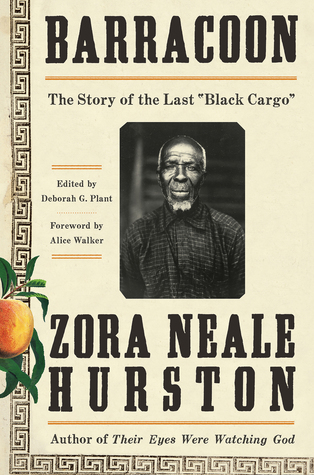Rating: 4 of 5 stars
Length: 193 pages
Published: May 2018
For a little over a year, I've devoted most of my reading time and review space to promotion of new (and often Texas) authors. I made the decision in the last quarter of this year to focus on reading some books on my personal to-be-read list. Barracoon: The Story of the "Last Black Cargo" by Zora Neale Hurston was a find through an Amazon daily deal back in July of this year that I have been meaning to get back to. I took some time over a long weekend to dig in and read this amazing work of non-fiction by Hurston, who is most notably remembered for her work of fiction - Their Eyes were Watching God.
Barracoon is a biographical account of the last known surviving and formerly enslaved African, Cudjo Lewis*, his capture and forced voyage in the trans-Atlantic slave trade on the Clotilda - the reported last slave ship to come to the United States from Africa. Barracoon is a Spanish word that translates to "barracks." It is the facility where Africans were held before being sold and transported into slavery. Koosula ended up in Alabama and eventually became a free man at the conclusion of the U.S. Civil War. He lived through capture, forced detainment, slavery, and the Reconstruction and Jim Crow eras. At 94, Koosula died in 1935.
*[Cudjo was known as Koosula in the motherland, and he seemed overjoyed for Hurston to refer to him by his real name. Therefore, for the remainder of this review, he will be Koosula.]
Hurston met Koosula at the request of Charlotte Osgood Mason, who funded Hurston's trips to Alabama to interview and write Koosula's story. As it happens with most biographers, Hurston developed a personal yet professional relationship with Koosula giving her an excellent vantage point from which to tell this very important story. I do feel it is important to read many stories and perspectives about slavery, lest we forget our sordid history, and I am thankful Hurston wrote this one.
As a reader, I could tell how much time and effort Hurston put into this book. I like that she stuck to her guns and demanded that it be published as she had written it - in Koosula's dialect. Unfortunately, this delayed the book's publication for nearly 90 years. However, I can understand her insistence on this. We, as the audience, need to hear Koosula. Writing it any other way would have muted his very emotional story. I appreciated the abundance of direct quotes provided. I could almost hear Koosula speaking, and I definitely could feel his emotion. Koosula was not really black or what we'd call African American today. He was an African forever displaced in this strange land he was forced to call home. His story is a sad one. Even after being freed he, like many African Americans today, and his family were grossly disenfranchised. All six of his children and his wife preceded him in death as a result.
While I read this book on my Kindle app, I think I'd like to hear the audio version. I have a feeling an oral re-telling would be an even more powerful vehicle for this story. I am overjoyed that Common has purchased the rights and is making this into a TV movie, and I can't wait to watch it. I gave this book four stars because I felt that there was some unnecessary repetition, and I wished Hurston had given us a little more biographical information on Koosula once he was in the United States. Even so, this short book is information-filled and an important part of American history.
Recommendation: This story is a must read. It won't take you long to finish it, so why not pick up a copy today?
Regardless of whether I purchase a book, borrow a book, or receive a book in exchange for review, my ultimate goal is to be honest, fair, and constructive. I hope you've found this review helpful.








0 comments:
Post a Comment